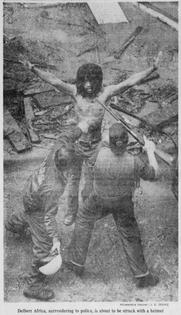Decades on, Delbert Africa’s surrender still provides powerful image of US racism and Black victimhood
Published in Political News
Forty-six years ago, on Aug. 8, 1978, Philadelphia police surrounded the house occupied by the controversial MOVE organization in Powelton Village with the intent to evict the predominantly Black group.
The result was a shootout that left police Officer James Ramp dead and 18 people wounded.
During the deadly confrontation, MOVE spokesman Delbert Africa was dragged, beaten and kicked by three white police officers. Just prior to the violent attack, Philadelphia Inquirer photographer Jim Domke captured a photograph of the MOVE member. His arms were outstretched as he attempted to surrender.
Africa served 42 years for the murder of Ramp and was released from prison in January 2020. He died six months later. He was 74 years old.
With the exception of news reports of Africa’s release from prison and subsequent death, Domke’s photograph has largely been sidelined to a mere footnote in American history.
Described in the media alternately as a “back-to-nature” group and a “terrorist” cult, MOVE defied simple explanation.
Members of the group all assumed the last name Africa. They eschewed modern technology, ate raw foods and advocated for animal rights. They spoke out loudly, often through blaring loudspeakers, against police brutality and other abuses of authority. They had also been cited by neighbors for child neglect and general lack of hygiene.
In short, MOVE was a polarizing entity.
It was not surprising, then, that the image of Delbert Africa surrendering to police would further divide Philadelphians.
With hair largely covering his face, the shirtless Africa stands in the center of Domke’s photograph that evokes the image of the crucifixion of Jesus Christ.
Poised to endure the officers’ blows, Africa is framed as a victim of police brutality – a message in direct tension with the white officer’s death.
As a scholar of American memory, I have argued in my research that the death of any police officer challenges the social fabric by underscoring the dangers of law enforcement work. Those deaths also require – for the sake of the larger society – an assurance that they were not in vain.
According to letters from readers printed in Philadelphia newspapers, there could be only one victim.
And that was not Africa.
It is easy to assume that Domke’s photograph has been relegated to the recesses of American public memory. Part of the problem is that the 1978 incident became overshadowed by an even more dramatic and violent police confrontation with MOVE that occurred seven years later.
In that 1985 incident, Philadelphia police dropped a bomb on the house occupied by MOVE in West Philadelphia. But instead of extinguishing the ensuing fire, Philadelphia police let the fire burn. Eleven people were killed, 60 homes were destroyed and about 250 people were left homeless.
Yet, it is my belief that further scrutiny of the photograph and its surrounding context can illuminate much about today’s ambivalence toward how to interpret visual evidence of Black victimhood.
It is then important to move beyond images that reduce people to either heroes or villains. Domke’s photograph of Africa’s surrender reveals more challenging and nuanced understandings of race, racism and power.
This article is republished from The Conversation, a nonprofit, independent news organization bringing you facts and analysis to help you make sense of our complex world.
Read more:
How to understand police violence: Not a case of good cop vs. bad cop
Black police officers aren’t colorblind – they’re infected by the same anti-Black bias as American society and police in general
Nicole Maurantonio does not work for, consult, own shares in or receive funding from any company or organization that would benefit from this article, and has disclosed no relevant affiliations beyond their academic appointment.
































































Comments